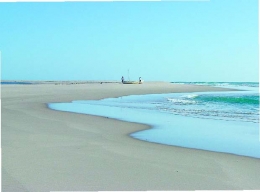WITH THE World Cup in South Africa next summer, neighbouring countries are set for a tourism boost – and the more adventurous and inquisitive travellers may pin Mozambique on their map.
The country is a little-known entity – partly because its civil war, which ended only in 1992, placed it off-limits for so long. And while the tourism industry remains largely undeveloped as a result, signs are positive, with the country recording the fastest tourist industry growth rate in the world in 2005.
Attractions include pristine beaches along 2,500km of coastline, game parks, the atmospheric Ibo Island and the beautiful coral island of Ilha de Mozambique, which is home to the oldest stone building in the southern hemisphere. Snork-elling and diving opportunities are also aplenty.
Indeed, the well-known Lonely Planet travel guide has described Mozambique as “one of Africa’s rising stars”, referencing “up-and-coming hot-spots, with stunning beaches, excellent diving and magical offshore islands.”
But have people in Ireland discovered this hidden gem?
Kerry Butler of travel agent Mozaictravel.com has worked in tourism since 1992, and says Irish people are showing an interest in trips to Mozambique “but not in huge numbers”.
“We get a lot of people who come to Mozambique who have already visited South Africa or Kenya and who want to visit a new place or a new part of Africa,” he explains.
Getting to Mozambique from Ireland requires a second flight through Portugal or Kenya, but Butler says the trip is ultimately worth it.
“I’ll give you four reasons,” he says. “Warm oceans and warm weather. Warm oceans and warm weather. Warm oceans and warm weather. And warm oceans and warm weather. It’s quite different from Irish weather.
“It’s not cheap,” he admits. “Africa as a whole is not cheap. But it’s untouched and you could have 20km of beach to yourself, or maybe you and just a few other people.”
Butler says there have been “huge strides in access to parks, facilities, and roads recently” and that the overall infrastructure has improved massively from the early 1990s.
“There’s a misconception that Mozambique is still in a civil war or something like it,” he says. “That’s not true. In Maputo, like in any big city, there is crime and places you wouldn’t want to go at night, but it’s not a dangerous place. The crime rate is considerably lower that South Africa or Kenya and people still go there.”
Ireland’s Ambassador to Mozambique, Frank Sheridan, says Irish visitors remain relatively few, but underlines that the country is an undiscovered diamond.
“It really is a beautiful, beautiful country. The word you hear again and again in Mozambique is ‘potential.' The potential is absolutely enormous.”
Recently, the country’s tourism ministry developed a marketing plan to promote Mozambique internationally. National tourism promotion director Jeremias Manussa says that Mozambique had a low profile, despite its natural tourism draws, but that this plan would “ensure the promotion of Mozambique as an emerging destination, with unique and exotic qualities on an international level.
“We also plan to position the country as a world-class competitive destination for investment, business and tourism. For that we believe the Mozambique brand can be a very important tool.”
The campaign, which will take place between 2010 and 2013 to take advantage of the influx of visitors to southern Africa for the World Cup, has targeted an annual investment of US$18.3m to market the country’s image abroad.












